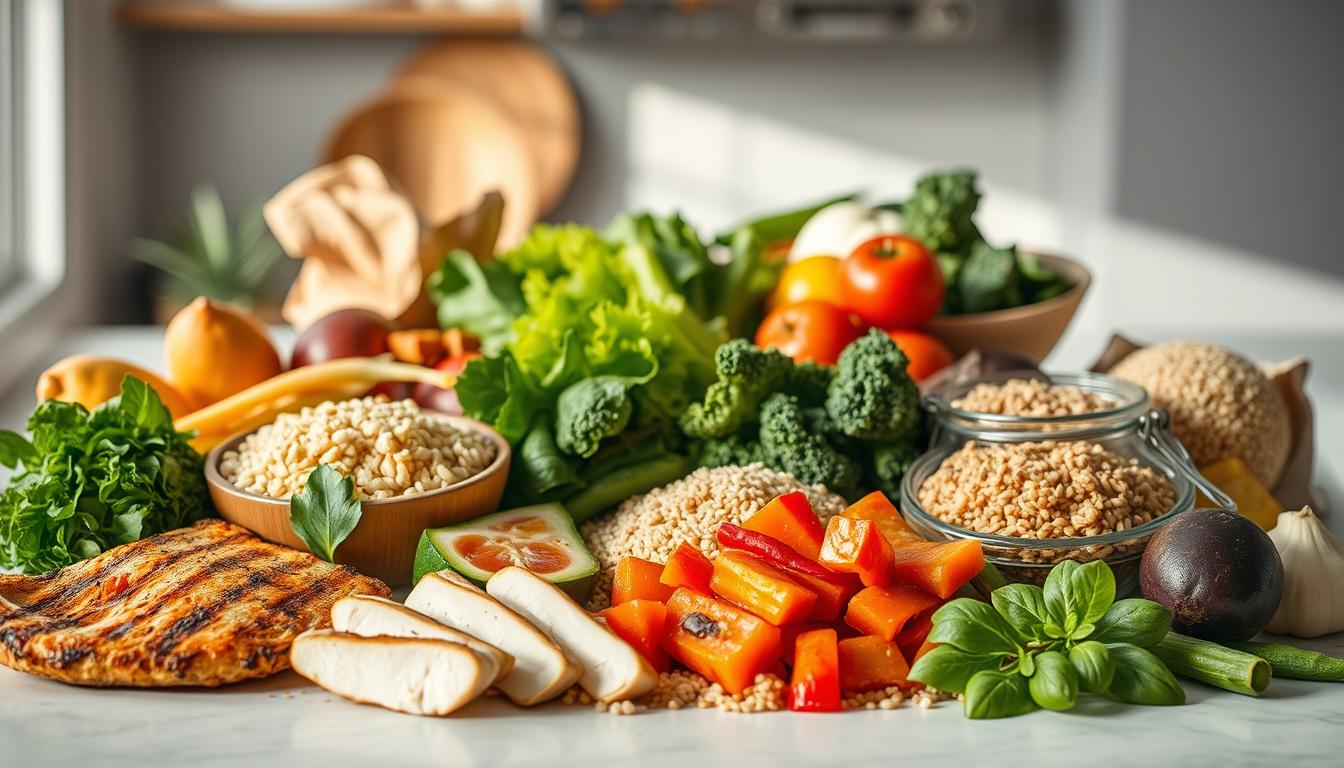Did you know that proper nutrition can significantly enhance your workout performance and recovery? For workout beginners, understanding the basics of nutrition is crucial for achieving fitness goals. A well-balanced diet provides the necessary fuel for exercises, helping to optimize results.
Nutrition plays a vital role in supporting muscle growth and repair. A beginner workout fuel guide should include a mix of proteins, complex carbohydrates, and healthy fats. By focusing on nutrition advice for workout newbies, individuals can avoid common pitfalls and maximize their progress.
Key Takeaways
- Proper nutrition enhances workout performance and recovery.
- A balanced diet is crucial for achieving fitness goals.
- Proteins, complex carbohydrates, and healthy fats are essential for muscle growth and repair.
- A well-planned nutrition guide helps beginners avoid common mistakes.
- Maximizing progress through informed nutrition choices is key.
The Fundamentals of Workout Nutrition
For workout beginners, a well-planned nutrition strategy is essential for achieving optimal results. A balanced diet not only fuels your workouts but also aids in recovery and progress.
How Food Fuels Your Exercise Performance
The food you consume directly impacts your energy levels and exercise performance. Carbohydrates are a primary source of energy, while proteins help in building and repairing muscle tissue. Healthy fats support hormone function and overall well-being.

The Three Pillars: Energy, Recovery, and Progress
A successful workout nutrition plan is built around three key pillars: energy, recovery, and progress. Ensuring you have the right balance of nutrients is crucial for optimizing your workout performance and achieving your fitness goals.
Setting Realistic Nutrition Goals as a Beginner
As a beginner, setting realistic nutrition goals is vital. Start by assessing your dietary needs and creating a meal plan that aligns with your workout routine. Focus on healthy eating habits and gradually adjust your nutrition plan as you progress in your fitness journey.
Understanding Macronutrients for Exercise
To optimize your workout performance, it’s crucial to understand the role of macronutrients in your diet. Macronutrients are the foundation of a healthy diet, providing energy, supporting muscle growth, and aiding in recovery.
Proteins: Building and Repairing Muscle Tissue
Proteins are essential for muscle repair and growth. Adequate protein intake is crucial for workout beginners to support muscle development.
How Much Protein Do Beginners Need?
The recommended protein intake varies, but generally, beginners should consume about 1.2 to 1.6 grams of protein per kilogram of body weight daily. This supports muscle recovery and growth.
Carbohydrates: Your Body’s Preferred Energy Source
Carbohydrates are vital for providing energy during workouts. Complex carbohydrates such as whole grains are preferred over simple carbs due to their sustained energy release.
Simple vs. Complex Carbs for Workouts
While simple carbs provide quick energy, complex carbs like oats and brown rice offer sustained energy levels, ideal for longer workout sessions.
Healthy Fats: Supporting Hormone Function and Recovery
Healthy fats play a critical role in hormone production and overall recovery. Including sources like avocados and nuts in your diet can support your workout routine.
Balancing these macronutrients is key to optimizing your workout performance and recovery. Consider incorporating pre workout meal ideas that include a mix of these macronutrients, and don’t forget post workout nutrition tips to aid in recovery.
What to Eat Before and After Workout for Beginners
As a workout beginner, understanding what to eat before and after exercise is crucial for optimizing your performance and recovery. Proper nutrition fuels your body, supports your exercise routine, and aids in muscle recovery.
The Optimal Timing Window for Pre-Workout Nutrition
Eating the right foods at the right time before a workout can significantly impact your performance. Aim to consume a balanced meal with complex carbohydrates and lean protein about 1-3 hours before your workout. For a quick snack, opt for something light, like a banana or a handful of nuts, 30-60 minutes prior to exercise.
Post-Workout Nutrition: The 45-Minute Recovery Window
After your workout, your body is in a state of recovery. Consuming a mix of carbohydrates and protein within 45 minutes can help replenish energy stores and support muscle repair. Some ideal post-workout snacks include a protein shake with fruit or a turkey sandwich on whole-grain bread.
Hydration Guidelines Throughout Your Fitness Journey
Staying hydrated is essential for both performance and recovery. Aim to drink at least 8-10 glasses of water per day, and make sure to hydrate before, during, and after your workouts. Monitoring your urine color can help determine if you’re drinking enough water; it should be pale yellow.
Electrolytes and Why They Matter
Electrolytes, such as sodium, potassium, and magnesium, play a crucial role in maintaining proper hydration and supporting muscle function. During intense or long workouts, consider consuming electrolyte-rich beverages or supplements to help maintain electrolyte balance.
- Key Electrolytes: Sodium, Potassium, Magnesium
- Electrolyte Sources: Sports drinks, coconut water, bananas, nuts
Pre-Workout Nutrition: Foods That Boost Performance
Fueling your body before a workout is crucial for maximizing performance and achieving your fitness goals. The right foods can provide the necessary energy, support muscle function, and enhance overall exercise performance.
Eat This: Top 5 Pre-Workout Foods for Energy
Choosing the right pre-workout foods can significantly impact your energy levels and workout effectiveness. Here are the top 5 foods to consider:
- Bananas: Rich in easily digestible carbohydrates and potassium, bananas are an excellent source of energy.
- Oatmeal: Provides sustained energy due to its complex carbohydrates and fiber content.
- Greek Yogurt: Offers protein to support muscle function and can be combined with fruits for a carbohydrate boost.
- Nuts and Seeds: Almonds, cashews, and chia seeds are rich in healthy fats and proteins, providing a slow release of energy.
- Whole Grain Toast with Peanut Butter: Combines complex carbohydrates with healthy fats for sustained energy.
Quick 15-Minute Pre-Workout Snack Ideas
For those with limited time before a workout, quick snacks can be just as effective. Consider:
- A handful of nuts and dried fruits.
- A small banana with a tablespoon of almond butter.
- A energy bar made with wholesome ingredients.
Not That: Foods That Sabotage Your Workout
Just as important as knowing what to eat is understanding what to avoid. Foods high in sugar, fat, or those that are difficult to digest can lead to energy crashes or discomfort during your workout.
“Avoid heavy meals or foods that are high in fat, sugar, or spice before a workout as they can cause discomfort and decrease performance.”
Why Timing Matters: 1-Hour vs. 3-Hour Pre-Workout Meals
The timing of your pre-workout meal can significantly affect your performance. Eating a meal too close to your workout can lead to discomfort, while eating too early may not provide sufficient energy.
- 1-Hour Pre-Workout: Opt for light, easily digestible foods like fruits or energy gels.
- 3-Hour Pre-Workout: You can consume a more substantial meal that includes a balance of carbohydrates, proteins, and healthy fats.
Post-Workout Nutrition: Recovery Essentials
Post-workout nutrition plays a vital role in helping your body repair and strengthen muscles after exercise. When you work out, you cause micro-tears in your muscle fibers, and the right nutrients help in repairing and rebuilding them, making them stronger over time.
Eat This: Ideal Recovery Foods After Exercise
Consuming the right foods after your workout is crucial for recovery. Protein-rich foods like chicken, fish, and eggs help in repairing muscle tissue, while complex carbohydrates like brown rice, quinoa, and whole-grain bread replenish energy stores.
Protein-Carb Ratios for Optimal Recovery
Aiming for a mix of protein and carbohydrates within 30-45 minutes after your workout is ideal. A general guideline is to consume a ratio of 1:3 or 1:4 protein to carbohydrates. For example, having a protein shake with a banana or a meal with grilled chicken and quinoa.
Not That: Recovery-Blocking Foods to Avoid
Just as some foods can aid in recovery, others can hinder it. Avoid consuming high-sugar foods and processed snacks that can cause an insulin spike and lead to energy crashes later. Also, limit intake of caffeine and alcohol as they can dehydrate the body.
When to Eat: Immediate vs. Delayed Post-Workout Nutrition
The timing of your post-workout nutrition is critical. Eating within 30-45 minutes after your workout is considered optimal for recovery. Delaying this window can result in slower recovery and less effective muscle repair.
By focusing on the right nutrients and timing, you can enhance your body’s recovery process, making your workouts more effective in the long run.
Adapting Nutrition to Different Workout Types
Tailoring your nutrition to your workout type can significantly enhance your exercise outcomes. Different workouts have different nutritional demands, and understanding these needs can help you fuel your body appropriately.
Cardio-Focused Workouts: Fueling for Endurance
For cardio-focused workouts, such as running or cycling, your body relies heavily on carbohydrates for energy. Consuming complex carbs like whole grains, fruits, and vegetables a day before your workout can help build up your energy stores.
Key foods for cardio endurance: Oatmeal, bananas, and sweet potatoes.
Strength Training: Nutrition for Muscle Building
Strength training requires adequate protein to build and repair muscle tissue. Aim to consume a mix of protein and carbohydrates within 30-60 minutes after your workout.
Example: Greek yogurt with berries and a scoop of protein powder.
HIIT and Circuit Training: Balanced Nutrition Approaches
HIIT and circuit training demand a balanced mix of carbohydrates and protein for energy and recovery. Focus on whole foods like lean meats, whole grains, and a variety of vegetables.
| Workout Type | Nutritional Focus | Example Foods |
|---|---|---|
| Cardio | Complex Carbohydrates | Oatmeal, bananas |
| Strength Training | Protein and Carbs | Greek yogurt, protein powder |
| HIIT/Circuit Training | Balanced Macronutrients | Lean meats, whole grains, vegetables |
Meal Prep Strategies for Workout Success
Meal prep strategies tailored for workout success can significantly enhance a beginner’s fitness journey. By preparing meals in advance, individuals can ensure they’re fueling their bodies with the right nutrients at the right time.
5 Simple Pre-Workout Meals Anyone Can Make
Pre-workout meals should be light, easy to digest, and rich in carbohydrates and protein. Here are five simple options:
- Oatmeal with banana and almond butter
- Whole-grain toast with avocado and eggs
- Greek yogurt with berries and honey
- Smoothie bowl with spinach, banana, and almond milk
- Whole-grain wrap with chicken and veggies
Quick Post-Workout Recipes Under 15 Minutes
After a workout, it’s essential to refuel with a mix of protein and carbohydrates within 45 minutes. Some quick recipes include:
- Grilled chicken with quinoa and steamed veggies
- Salmon with brown rice and mixed greens
- Turkey and avocado wrap
Batch Cooking Tips for Busy Fitness Beginners
Batch cooking can save time and ensure consistency in nutrition. Tips include planning meals, cooking in bulk, and using a slow cooker.
Storage and Portability Solutions
Investing in good quality, portable containers can make meal prep more efficient. Look for containers that are microwave-safe and leak-proof.
Conclusion: Creating Sustainable Nutrition Habits
Developing optimal nutrition for workout beginners is crucial for achieving fitness goals. By understanding the fundamentals of workout nutrition, including macronutrients and meal timing, individuals can fuel their bodies for optimal performance and recovery.
Creating sustainable nutrition habits involves more than just knowing what to eat; it’s about developing a balanced approach that supports overall health and fitness. By applying the principles outlined in this article, workout beginners can establish a strong foundation for long-term success.
As you embark on your fitness journey, focus on making informed choices about your nutrition. With the right fuel, you’ll be better equipped to push through challenges and achieve your goals. By prioritizing optimal nutrition, you’ll be taking a significant step towards a healthier, more balanced lifestyle.
